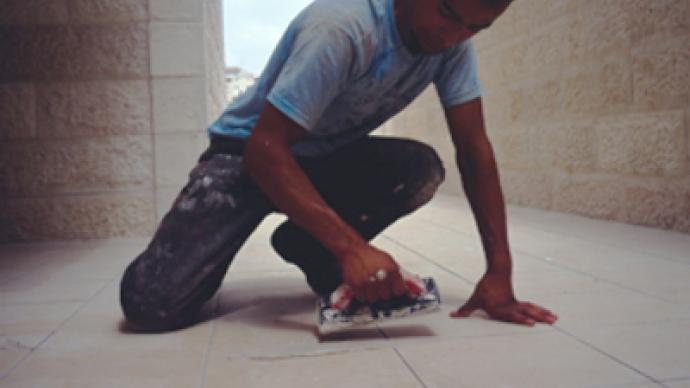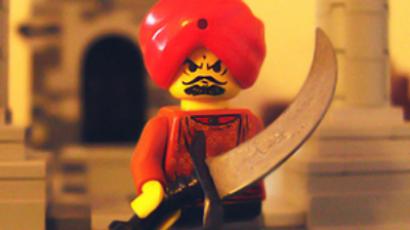Under cover of the night: Palestinian ghost workers in Israel

Secret routes, fake IDs, risking freedom and even their lives – despite all this, illegal Palestinian workers flow to Israel in search for jobs they have no chance of finding at home.
"We built Israel," says Abbas. He has been traveling illegally to Tel Aviv to work on a building site since 2001. In the 1950s, Palestinians crossed borders into Israel to work on their former fields. After 1967 those borders were erased. Now, with the separation wall, those borders exist again – if you have the wrong ID papers. While the older generation can get security clearance to work in Israel, the younger generation is re-treading forgotten paths that were once used during the 1950s by their fathers and grandfathers – secret routes. In 2009, there are between 35,000 and 40,000 illegal workers – ghost workers – according to the Palestinian Workers' Union. "They [Israelis] can't get by without us and we can't get by without them," says Hassan, who works in an upscale Tel Aviv restaurant on a forged Israeli ID.
A gray and flawless 8-meter high concrete creation zigzags inside the Green Line like a thick artery, truncating land. It is decorated with activists' art in places. The Wall's construction was started in 2002 by the State of Israel during the second Intifada. Ariel Sharon, the then-prime minister, said, "a fence is not a political border, it is not a security border, but rather another means to assist in the war against terror, and greatly assists in stopping illegal aliens." The suicide bombings declined, the "fence" slithered even further into Palestinian land, and illegal aliens became like ghosts in Israel.
The World Bank has identified Israel's closure and movement-restriction regime as a leading cause of the rapid deterioration of the Palestinian economy.
Running the checkpoints
At night Tel Aviv unveils itself with its night creatures and pastimes. It is doubly odd with Arabic music blaring from a car's speakers. In the front seat is Hassan, who baked bread for 10 years in a topnotch restaurant, and is involved in illegal business on the side. He built a villa and soon will get married and leave Tel Aviv, where he has spent half of his life. Beside me, young Ibrahim has been sneaking into Tel Aviv since he was 16, looking for a job, fun and nice clothes.
Both men came from a small village near Nablus. And now they are wrapped up by Tel Aviv's nights and the limited possibilities their forged IDs can afford them. Back in another small village near Nablus, another illegal worker, Jalal, was shot in the head.
Deir al-Hatab is a small village near Nablus in the northern West Bank. People grow olives there and fought the Israeli occupation during the first and second Intifadas. There is an aura of war's aftermath. Many were in jail, many were militants, and many faces are on photoshopped posters with Al-Aqsa backgrounds and with M16s in their hands – Shaheed (martyr) posters. Many are blacklisted and forbidden to work in Israel.
At Jalal Ouda's family house, his mother looks with pride more than grief now at her son's posters that cover the corner of their small living room. Tall, skinny, with high cheekbones, he died at 26. A mosque behind him, the word shaheed beneath his name. In 2006, he was shot by the Israeli Defense Forces when a taxi driver transporting illegal workers attempted to race away from soldiers at Hawara check point. "The driver took the Elon Moreh settlement road to save time," Umm Jalal, his mother, remembers." When the driver saw that the soldiers stopped another two vans with illegals he tried to escape. The boys asked him to stop." Two other workers were wounded and Jalal was killed outright. Mild protests echoed from human rights organizations, but little has changed. "People will not stop going to work in Israel. People aren't scared," says Ramzy Ouda, Jala's brother.
The wall at dawn
Back in Wadi Fukin (8km from Bethlehem) the night is calm. The village is located between the Green Line and the Israeli West Bank wall. The lights from settlements glitter across the valley, surrounding it on three sides. Across the free side, thorny mountains stretch, crawling with border police and monitored by Apache helicopters – the 35km ghost worker route.
We sat on the terrace contemplating the silence of the night. Bassam spent most of his life building settlements. He extended the house and bought a BMW. He has a work permit because he is over 35, has a family and a clean record. Palestinians are highly involved in the Israeli construction business – there are around 12,000 Palestinians who are employed by Jewish and Arab contractors in building and expanding settlements. They make three times more than working for Palestinian employers, however for Israelis it is a cheap labor. Bassam comes home late, tired and with just enough energy to greet his family and play with his lively 4-year-old son. Next day he will wake up at 4 am to go to the check point in Bethlehem.
Under graffiti of a spread palm with five religions written on the fingers and a heart nested in the middle, hundreds of men over 35 squash into a fenced walkway. Fathers with work permits wait under the Wall's floodlights. Israeli border police admit them in starts and the line moves faster. The impatient ones squeeze through holes in the outer fence. Jerusalem just starts to wake on the other side. It is 4am. They need to be at work by 7 and leave at 3pm, as sleeping over is illegal – those are the security rules. Bassam is somewhere in the thick line of workers, under the activists’ signs - "one love Palesrael", "politicians bastards" and "Israel recuerda [reminds of] Berlin". Before the Wall, before the second Intifada, there were no permits. There are now around 21,600 Palestinian workers with legal work permits, according to the Palestinian Workers' Union.
Welcome to Israel
Geha junction in Tel Aviv is a busy place in the morning and in the afternoon, when Palestinian workers go to and from work. It is a goldmine for young drivers. "You know how much I make in one month? Over $4000!" says Khalil, a Druze Arab Israeli, smugly. Beside him, several other young men in their twenties wait; neat clothes and gelled hair. They bargain the prices of rides to the checkpoints with workers old enough to be their fathers. "Do you have a permit? Yes, then hop in," Khaled, 21 from Kfar Kasem (10 miles from Tel Aviv), sifts though the workers. The illegal ride from Palestine to Israel costs ILS 200 (USD 50) on average, a price I would pay to travel from Tel Aviv to Cairo overland. Legal workers pay less. It is a hierarchy, depending on where you were after 1948 and 1967. Palestinians who stayed after the 1948 war were given Israeli papers. Palestinians who were under Israeli administration when it occupied the West Bank in 1967 have only Palestinian papers.
"We do not argue with them as they can report us to the police," said Abbas, an illegal worker. "I am afraid of Arab Israelis more than Israelis," said Ibrahim, who lives in Tel Aviv under a forged Israeli Arab ID.
"We have no jobs here, so the only option to build your life is to go and work in Israel." said Abbas, 26, "yes it is risky but what else we can do?" The unemployment rate in the West Bank ranges from 19.5 to 15.9 per cent, fluctuating due to seasonal agricultural work, according to the Palestinian Bureau of Statistics. He told me that they travel from Salem, to Nablus, to Ramallah, to Bethlehem, where they cross the wall. Then they start their walk for up to four hours and arrive in Israel, where they are picked up by Israeli Arab drivers for ILS 200 (USD 50) and taken to Geha junction in Tel Aviv. He makes around ILS 3000 (USD 790) a month, stays in Israel for 5 days a week squatting at the building site where he works, and back home – via the same secret route. Abbas is studying to become a teacher, but for now his livelihood is about keeping a low profile and building houses behind the hoardings.
"Sometimes Israeli neighbors come to the site and bring us water or some food. However, when you are done they have no interest in you anymore," says Abbas. If police find out their location, for those Palestinians it could be the last time they see the land of milk and honey. A second arrest could cost them months in an Israeli jail. For a contractor it could be a fine of up to ILS 30,000 (USD 7,940). At the end of work, the workers usually burn the foam they sleep on so as not to leave traces.
Word of mouth – that's how Palestinians find work on the other side of the wall, how secret routes are mapped and journeys are priced.
Name taken
An Israeli ID costs ILS 1500-3000 or around USD 400 – 800, Ibrahim told me (or Joseph according to his Israeli ID). You still use secret routes entering Israel, but you can get a job in the service industry. Service jobs pay double construction rates, Hassan, who is involved in a business forging Israeli papers, told me. The cards give you the option of coexisting within the skillfully woven Israeli security system – as long as Israeli police do not run your card through their database and find a mismatch between the photo on the screen and the person in front of them. The young men cannot risk going to the movies.
"I would love to go back and live in my land," Hassan says, anticipating the day he returns and settles down in Palestine. He is getting married next year and has enough capital to open his own business after working in Israel for 15 years. Ibrahim was in an Israeli jail for 28 days because he switched car plates and went with his friends to a settlement to shop for clothes. He says, "Palestinian society is complicated and strict. I want to travel abroad." He is more preoccupied by having his freedom, nice clothes and a European lifestyle than about the politics of the two countries in the gap of which he exists.
Note: some names were changed in the article for security reasons.
Mona Abouissa for RT













